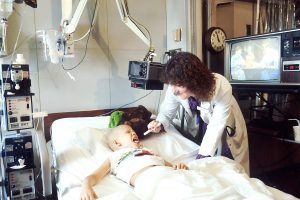Working in healthcare as Personal Support Worker (PSW) gives you many opportunities to continue your studies.
There are quite a few options to choose your further studies, however the most commonly and probably the best option is to become a nurse.
If this is what you want to do, the next milestone for you will be to become a Registered Practical Nurse (RPN).
We have very comprehensive information available on this topic.
Be sure to check it out!
If you’re choosing to become a nurse, you may want to know more about this field. Well, this is exactly what you’ll accomplish after reading this article.
A REGISTERED PRACTICAL NURSE (RPN)
There are approximately 32 000 RPNs currently working in Ontario.
Approximately, 39% of practical nurses are employed in the hospital sector and 13.9% reported to have been working in the community as of the year 2011.
Further, there has been a small yearly increase in the amount of RPNs working in the province each year as reports indicate that there was a rise of 3.3% in the number between 2010 and 2011.
Practical Nursing also comprise the highest number of nurses providing care in long-term care facilities.
Statistical evidence indicates that they make up the fastest growing group within the community care sector throughout the province.
RPNs are trained and regulated under one central administrative body.
They are community college graduates who are required by the College of Nurses of Ontario (CNO) to successfully complete a recognized and accredited program and pass a final examination.
RPNs are also expected to maintain their registration and therefore must demonstrate their understanding and knowledge of updated practices in order to preserve their status as health care professionals.
In addition to schools and private practices, they work in a variety of different areas including public health facilities, community agencies and nursing homes.
RPN SALARY
Recent data suggests that a Registered Practical Nurse salary in Ontario can be range from approximately $45 000 to $49 000 per annum.
Although practical nurse salary depends on the amount of experience and the particular facility he or she works in, most RPNs in the province are paid upwards of at least $40 000 per year.
Nationally, the average is between $38 000 and $52 000 annually which includes overtime pay and bonuses.
Based on recent data, three of the province’s most popular employment agencies pay similar annual wages to those who are employed with them in RPN positions.
| Name | Annual Salary (Approximate) |
|---|---|
| Bayshore healthcareBayshore Home Health | $47,108 |
| Saint Elizabeth HealthcareSaint Elizabeth Health Care | $45,849 |
| VONVictoria Order or Nurses | $46,787 |
The rate of pay an RPN receives can be higher in certain cases if they possess specialized skill sets.
Therefore those who have experience working in psychiatric facilities, operating rooms, labor and delivery as well as palliative and acute care areas can earn approximately 3% to 7% more per year than both the provincial and national average.
SCOPE OF POSITION
RPNs are required to possess a foundational knowledge that combines nursing skills with sound judgement within the context of traditional nursing and bedside care.
// ]]>They typically work in a team setting and are delegated tasks and responsibilities as needed by a Registered Nurse (RN) who plays a supervisory role.
Unlike RNs, RPNs have the responsibility to determine the care for patients whose needs are defined and there is a minimal chance of significant health status fluctuations.
The breadth of their knowledge is higher than that of a PSW in that they are required to have a more complex understanding of patients’ needs.
GENERAL DUTIES
The duties of RPNs are varied. Here’s a very basic glimpse of what they do:
- Implementation of necessary interventions as defined by institutional policies,
- Responding to emergencies by identifying changes in a patients’ state of health,
- Working with other health professionals involved in the care of patients,
- Observing and recording changes that will affect the patients’ care plan, and
- Assisting with the admission and discharge of a patient.
REQUIRED APTITUDES
RPNs must be able to possess specific skills and abilities in order to perform their jobs efficiently. RPNs are thus required to have the following aptitudes:
- A professional and compassionate approach towards patients and their work,
- The ability to adhere to the care plan devised by supervising staff members,
- Ability to work in a team environment,
- Efficiency at prioritizing required tasks,
- Advanced time management skills,
- Strong organizational skills,
- Proficient computer skills, and
- Critical thinking ability.
There are therefore several differences between the roles and duties performed by PSWs and practical nurses.
Not only is there a contrast between the responsibilities, pay, regulation and required aptitudes involved in entering the two fields, the scope of the positions differ significantly as well.
Being aware of the differences between PSW and RPN positions can potentially assist you in choosing the manner in which you ultimately choose to continue your studies.
Recommended Reading









